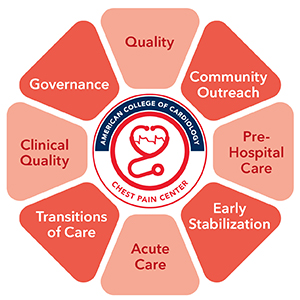Chest Pain Center Certification Features & Benefits
Critical Access Hospitals and FreeStanding EDs awarded Chest Pain Center Certification achieve a higher level of expertise when dealing with patients who arrive with symptoms of a heart attack. Certification improves the clinical processes for the early assessment, diagnosis and treatment within facilities. Our process improvement methodology leads to...
- More efficient and effective evaluation
- Rapid treatment of patients with chest pain and other heart attack symptoms
- Better educated healthcare professionals and a more well-informed community
CPC Certification helps you:
- Reduce variations of care
- Lower length of stay (LOS)
- Sustain consistent process improvement
- Decrease readmissions and return visits
- Maximize reimbursements
You are not alone on your path to Chest Pain Center (CPC) Certification. Partnering with your care team is the ACC, the professional home for members of the CV care team. Our experienced staff of Accreditation Review Specialists have helped hundreds of hospitals become accredited Chest Pain Centers and now help Critical Access Hospitals and FreeStanding EDs through a similar certification process. Using measures aligned with the latest ACC/AHA Guidelines — CPC Certification provides actionable data to support more informed clinical decisions. Through the Certification tool, you can focus on:
- Actionable data for Low-Risk, NSTE-ACS, and STEMI patients
- Key performance metrics to track quality of care and identify opportunities for improvement
- Operational measures associated with patient outcomes and organizational performance
- Greater collaboration and partnership between the entire multidisciplinary CV care team
Easing Data Collection with NCDR Chest Pain - MI Registry™
Facilities must participate in NCDR Chest Pain - MI Registry and utilize the registry as the data source for CPC Certification. The registry serves to track your quality metrics for the Low-Risk, Unstable Angina, NSTEMI, and STEMI populations, allowing you to keep a pulse on quality and identify areas of process improvement.
Value-Added Services for CPC Certification:
- Assigned Accreditation Review Specialist for coaching and guidance
- Certification Training
- Informational Webinars (live and on-demand formats)
ACC's Emergency Medical Services (EMS) Partner in Care Recognition highlights EMS agencies that have a solid partnership with a Chest Pain Center (CPC) Accredited or Certified facility. Participating facilities build robust, ongoing relationships with their local and regional EMS partners to ensure the highest level of care for patients who may be experiencing a heart attack.
EMS Partner in Care Recognition is the opportunity to showcase the valuable collaboration between the hospital and EMS to the community and patients, showing that, as a team, you are delivering the best practice in patient care.
Eligibility Requirements
- The EMS agency must be in partnership with facilities applying for CPC Accreditation or Certification.
- The facility must provide documentation to the Pre-Hospital Care Essential Component requirements, including a charter with signatures between medical directors from the hospital and EMS, quarterly meeting minutes, and attendance records demonstrating a tangible relationship with mutual goals, metric sharing, and collaboration.
Process for Achieving EMS Partner in Care Recognition
- The hospital or facility collaborates with the EMS agency to complete the EMS Partner in Care application , which will be sent to the Customer Care Manager and the Accreditation Clinical Product Manager for review.
- The Accreditation Clinical Product Manager validates the EMS agency has an active ongoing collaboration with the facility through documentation the facility has uploaded to support the "Pre-Hospital Care" Essential Components.
- Once the recognition has been awarded, a Customer Care representative will notify the facility and EMS agency of the approved recognition.
- Through this recognition, EMS receives a unique Partner in Care seal that corresponds to the facility Chest Pain Center Accreditation or Certification seal. The facility and EMS will be given graphics to highlight their participation.
EMS pre-hospital care and treatment directly impact patient outcomes by preparing patients for the ED or Cath Lab. With EMS Partner in Care, the ACC recognizes the crucial role of EMS in initiating care and getting the patient to the right hospital at the right time to impact the overall patient outcome.
Process improvement leads to quality improvement with greater efficiencies across the continuum of care, and more timely and accurate diagnosis and guideline-driven treatment of ACS patients. Your assigned Accreditation Review Specialist offers ongoing support, assessment and review, and will help you establish a future-focused strategic plan to lower the cost of care while improving the quality of care. CPC Certification uses the most up-to-date performance measures and guidelines to:
- Increase community awareness of ACS symptoms and early access to care
- Improve relationships with EMS and integrate EMS into the patient care process
- Align each process to latest ACC/AHA guidelines and best practices
- Ensure appropriate risk stratification for placement of patients based on clinical presentation, diagnostics, and treatments
- Design smart pathways for low-risk chest pain patients, including patient shared decision-making
- Decrease time and cost by developing an appropriate non-invasive ischemia testing strategy
- Construct proven methods to rapidly identify the AMI patients to decrease door to treatment times
- Reduce STEMI patients Door-to-Reperfusion (D2R) times (including thrombolytics and transfer for Primary PCI)
- Employ clinical pathways and treatment strategies across all transitions of care
- Streamline cross-department processes and enhance CV team collaboration
- Identify gaps, measure results, and revise current processes to meet goals

To help you reach your certification and quality improvement objectives, CPC Certification organizes process improvement efforts across eight essential components:
- Governance: Establish a multi-disciplinary committee with executive support to provide orchestration of cardiac program operations, clinical oversight, and provide education to meet the needs of providers and staff.
- Quality: Establish a plan to integrate continuous improvement in all aspects of care, including quality monitoring and evaluation of processes, in the care of the patient.
- Community Outreach: Increase community awareness of heart attack signs and symptoms, including an Early Heart Attack Care (E.H.A.C.) program. Develop educational programs through partnerships with EMS, local healthcare providers, employers, and the community-at-large to increase public awareness of the value for early patient engagement for heart attack care and hands-only CPR.
- Pre-Hospital Care: Build a solid partnership with EMS to integrate first point-of-care processes with facility care.
- Early Stabilization: Hardwire immediate assessment and stabilization protocols to evaluate, risk stratify, and manage patients who are either at risk of or are having an acute occlusive event. Solidify the criteria and observation pathway for those patients needing additional diagnostic testing.
- Acute Care: Develop an effective strategy for the management of ACS patients, including an ischemia-guided strategy. Protocols and order sets designed to reflect current ACC/AHA guidelines.
- Transitions of Care: Establish care coordination at discharge, including early follow-up care and patient/family education, to prevent unnecessary and costly re-admissions.
- Clinical Quality: Measure and evaluate operational performance and adherence to evidence-based guidelines, proven to optimize the quality of care.
- Designation: Pinpoint the requirements for one of the two types of CPC Certification designations, each based upon a facility's treatment strategy and capabilities.
The comprehensive, sustainable approach to process and care improvement is your blueprint for a successful certification and optimal long-term value. By ensuring all stakeholders speak the same language and use the most up-to-date protocols and policies, you enhance efficiencies and eliminate variations in patient care. Consequently, you’re able to optimize patient outcomes and financial performance. CPC Certification helps your facility:
- Reduce the liability of missed heart attacks through a consistent approach to risk stratification of the ACS patient
- Improve patient throughput and volumes
- Reduce costly admissions
- Establish more appropriate lengths-of-stay (LOS)
- Enhance patient engagement leading to improved patient satisfaction scores
- Meet the demands of the ever-changing healthcare market
- Create operational efficiencies to improve the bottom line

